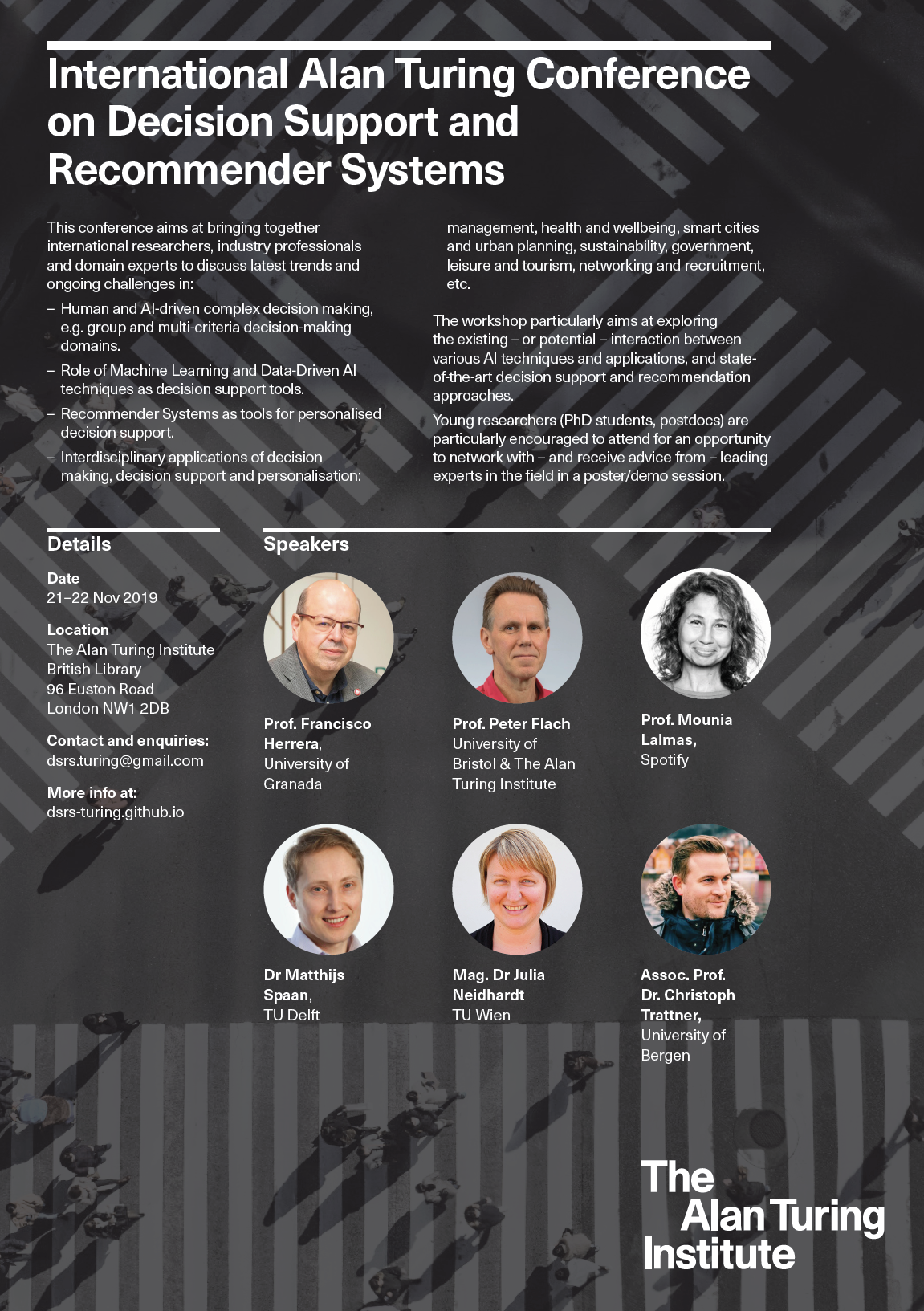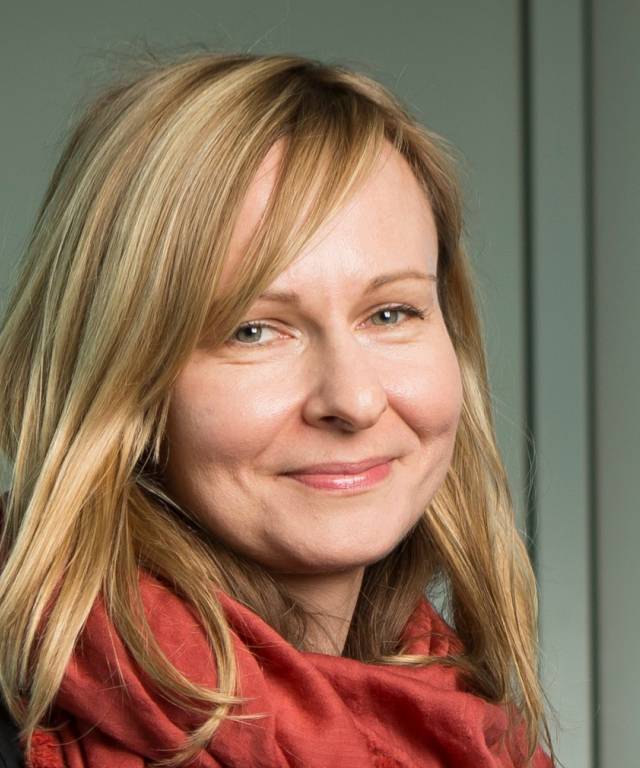
NEWS (30 October 2019) - FULL PROGRAMME NOW AVAILABLE
1st International ‘Alan Turing’ Conference on Decision Support and Recommender Systems (DSRS-Turing 2019)
[12th November 2019] REGISTRATION IS CLOSED - Conference Tickets SOLD OUT
NEWS! - We are excited to announce that our Technical Programme will include an Expert Panel session on "Ethics, Explainability and Interpretability in Decision Support and Recommender Systems"! For more details, check Programme
Objectives
Decision Making processes constantly occur in our daily lives, both at an individual, collective and large-scale societal level. Even for machines and AI systems, making autonomous and rational decisions has nowadays become part of their core duties. Decision making often occurs amid highly dynamic, uncertain and data-pervaded scenarios, thereby becoming increasingly complex. This conference based in the UK’s Alan Turing Institute brings together international researchers, industry professionals and domain experts to discuss latest trends and ongoing challenges in:
- Human and AI-driven complex decision making, e.g. group and multi-criteria decision-making.
- Role of Machine Learning and Data-Driven AI techniques in supporting decisions.
- Recommender Systems as tools for personalised decision support.
- Interdisciplinary applications of decision making, decision support and personalisation: management, health and wellbeing, smart cities and urban planning, sustainability, government, leisure and tourism, networking and recruitment, etc.

Topics of Interest
Students, researchers and professionals with interest or expertise in the following topics are encouraged to attend:- Decision Support Systems: Theoretical Foundations, Models, Implementations and Applications
- Recommender Systems: Theoretical Foundations, Models, Algorithms, Implementations, Evaluation and Applications
- Decision-making, Decision Support and Personalisation based on...
- Machine Learning
- Data Analysis and Data Fusion
- Expert and Information Systems, Knowledge-based Systems
- Group and Multi-Criteria Decision Analysis
- Context-Aware Recommendation
- Reciprocal Recommender Systems
- Artificial Intelligence Methods
- Evolutionary Algorithms
- Computer Vision
- Natural Language Processing and Text Mining
- Social Network Analysis
- Financial Technologies
- Robotics, Autonomous and Multi-Agent Systems
- Fuzzy Systems and Uncertainty Modelling
- Urban Analytics, Smart Cities and IoT
- Fairness, Explainability, Privacy and Ethics
- Applications: Security, Health & Wellbeing, Environment, Impact, Government, Smart Cities, Manufacturing, Tourism and Leisure...
Submission
Young researchers are invited to submit extended abstracts in English.
- Any submissions within the scope of the Topics of Interest list are welcome.
- We recommend a maximum of 4 pages in single column formatting, please use the conference Template for preparing your submission (Download Template).
- The submission of the extended abstracts is intended for young researchers: PhD students, postdocs or academics/scientists who received their PhD on or after 2014.
- Authors of accepted abstracts will be invited to showcase a poster – and optionally to present a demo – of their work, to network with and receive feedback from senior experts and attendees in general. Some selected authors will be also invited to deliver an 8-minute Flash Talk at a conference session.
- The submission and acceptance of an extended abstract are not requirements for attendance. This conference is open for registration by any delegates from across the Turing Institute and abroad.
Submission system now open! Submit your extended abstract here
Important dates and Registration
- Submission of Extended Abstracts (EXTENDED): 8th September 2019
- Registration opens: 20th September 2019 (tbd)
- Notification of acceptance of Extended Abstracts: 25th September 2019
- Final camera ready submissions (by email): 25th October 2019
- - REGISTRATION IS CLOSED - Conference Tickets SOLD OUT
- DSRS-Turing Conference: 21-22nd November 2019
Registration fee is £120. The conference is partly sponsored by the Alan Turing Institute and so we have put every effort on keeping comparatively low registration fees to welcome all interested attendees. Registration includes access to the entire programme, coffee breaks, lunches, conference booklet, and an informal drinks reception on the evening of the first day.
Program
Speakers

Professor Peter Flach
University of Bristol; The Alan Turing Institute (United Kingdom)
Title: Better Decisions with Machine Learning

Professor Mounia Lalmas
Title: Personalising the Listening Experience

Dr Christoph Trattner
Title: Computational Analytics on the Web for Better Food Decision Making

Dr Julia Neidhardt
Title: Recommender Systems and Decision-making in the Tourism Domain .

Dr Matthijs Spaan
Title: Sequential Decision Making under Shared Resource Constraints.
Expert Panel: "Ethics, Explainability and Interpretability in Decision Support Systems and Recommender Systems"
Chair: Dr. David Leslie. The Alan Turing Institute.
Panel Organisers: Christina Hitrova (Research Assistant in Digital Ethics) and Dr. Ivan Palomares (Turing Fellow). The Alan Turing Institute.
Overview
As decision-support (DS) and recommendation systems (RS) become deployed more widely across society, their impact on individuals grows. They are now involved in personalising the interest rate on loans or insurance, in shaping our political views by tailoring content, or in helping diagnose medical conditions and make treatment decisions. Whether automatically or by informing human decision-making, such tools have an irrefutably large impact on our life and work.
In this panel, we will take a closer look at the ethical questions arising from using DSRS. In addition, the panel will look at the ethical challenges that emerge in designing and implementing DSRS and will explore practical ways of thinking about ethics when building such tools. This panel discussion will focus on the role of interpretability and explanainability of models and their outputs in ensuring accountable and ethical design of DSRS tools.
Final Schedule
Thursday 21st November9.30-10.15 Registration
10.15am Welcome: Ivan Palomares-Carrascosa
10.30 Talk 1: Francisco Herrera
11.30 Coffee break
12.00 Oral Paper Presentations I
13.00 Lunch break
14.00 Talk 2: Matthijs Spaan
15.00 Poster-demo Coffee Break
15.30 Oral Paper Presentations II
16.00: Talk 3: Julia Neidhardt
17.00-onwards social event
Friday 22nd November
10.00 Talk 4: Peter Flach
11.00 Coffee break
11.30 Talk 5: Christoph Trattner
12.30 Oral Paper Presentations III
13.00 Lunch break
14.00 Talk 6: Mounia Lalmas
15.00 Poster-demo Coffee Break
15.30 Expert Panel: "Ethics, Explainability and Interpretability in Decision Support Systems and Recommender Systems"
16.30 Closing
List of accepted papers
Oral Paper Presentations I (Thursday 21st November, 12-1pm)T01 - On Tour: Harnessing Social Tourism Data for City and Point of Interest Recommendation. Tom Bewley, Ivan Palomares.
T02 - Bip4Cast: Some advances in mood disorders data analysis. Victoria Lopez, Pavél Llamocca, Diego Urgeles and Milena Cukic.
T03 - Content-based Recommender Systems for Heritage: developing a personalised museum tour. Olga Loboda, Julianne Nyhan, Simon Mahony, Daniela Romano and Melissa Terras
T04 - Modeling a Decision-Maker in Goal Programming by means of Computational Rationality. Manuel Lopez-Ibanez, Maura Hunt.
Oral Paper Presentations II (Thursday 21st November, 15.30-16pm)
T05 – A hybrid decision making system using image analysis by deep learning and IoT sensor data to detect human falls. Pingfan Wang and Nanlin Jin.
T06 – Decision making model based on expert evaluations extracted with sentiment analysis. Cristina Zuheros, Eugenio Martínez-Cámara, Enrique Herrera-Viedma and Francisco Herrera.
Oral Paper Presentations III (Friday 22nd November, 12.30-1pm)
T07 – A group decision-making procedure where agents with different expertise evaluate alternatives through qualitative assessments. José Luis García-Lapresta and Raquel González del Pozo.
T08 – Realising the Potential for ML from Electronic Health Records Haoyuan Zhang, D. William R. Marsh, Norman Fenton and Martin Neil.
Poster Presentations (afternoon coffee break on both days)
From Pictures to Touristic Profiles: A Deep-Learning based Approach. Mete Sertkan, Julia Neidhardt and Hannes Werthner.
Design of a clinical decision support system for critical care treatment optimisation. Christopher McWilliams, Iain Gilchrist, Matt Thomas, Timothy Gould, Raul Santos-Rodriguez and Christopher Bourdeaux
Learning Spare Changes in Time-varying MNs with Density Ratio Estimation and Its Application to Fmri. Yulong Zhang, Christelle Langley, Jade Thai and Song Liu
Extracting Emerging Patterns with Change Detection in Time for Data Streams. Cristobal J. Carmona, Angel Garcia-Vico, Pedro Gonzalez and Maria Jose Del Jesus
Personalised Playlist Prediction. Lewis Bell, Carlos Del Ray and Eimear Cosgrave
Vectology – exploring biomedical variable relationships using sentence embedding and vectors. Benjamin Elsworth, Yi Liu and Tom Gaunt
Proceedings
Coming soon...Committee
Organising Committee: Ivan Palomares Carrascosa, University of Bristol, UKJames Neve
Hugo Alcaraz-Herrera
Benjamin Arana-Sanchez
Programme Committee
- Hugo Alcaraz-Herrera (University of Bristol, UK)
- Benjamin Arana (University of Bristol, UK)
- Alejandro Bellogin (Universidad Autonoma de Madrid, Spain)
- Katharina Burger (University of Bristol, UK)
- Ivan Cantador (Universidad Autonoma de Madrid, Spain)
- Cristobal J. Carmona-del Jesus (Universidad de Jaen, Spain)
- Macarena Espinilla (Universidad de Jaen, Spain)
- Frank Hopfgartner (University of Sheffield, UK)
- Anna Jurek-Loughrey (Queen's University Belfast, UK)
- Mesut Kaya (Technological University (TU) Delft, Netherlands)
- Daniel Kershaw (Elsevier, UK)
- Sergey Kovalchuk (ITMO University, Russia)
- Zhiwei Lin (Ulster University, UK)
- Victoria Lopez (Universidad Complutense de Madrid, Spain)
- Eugenio Martinez-Camara (Universidad de Granada, Spain)
- Javier Medina (Universidad de Jaen, Spain)
- Rosana Montes (Universidad de Granada, Spain)
- Julia Neidhardt (Technological University (TU) of Wien, Austria)
- James Neve (University of Bristol, UK)
- Ivan Palomares (University of Bristol & The Alan Turing Institute, UK)
- Massimo Quadrana (Pandora Media, Italy)
- Oscar Gabriel Reyes-Pupo (Universidad de Córdoba, Spain)
- Raul Santos-Rodriguez (University of Bristol, UK)
- Hanna Schäfer (Technical University of Munich, Germany)
- Marko Tkalcic (Free University of Bolzano, Italy)
- Zhen Zhang (Dalian University of Technology, China)
Venue
Conference Location
The Alan Turing Institute,
British Library, 96 Euston Rd, London NW1 2DB, London (United Kingdom).
Travel
By train
Kings Cross and St Pancras International and Euston
By Underground
King's Cross St. Pancras, Euston and Euston Square
By bus
Many services: including 10, 30, 59, 63, 73 and 91
By car
There is no onsite parking.
The nearest car park is the NCP one in Judd Street, 10 minutes' walk away.
Metered parking (08:30 – 18:30) is available on Ossulston Street (3 spaces only).
By bicycle
There are covered and uncovered areas for bicycles. The best approach from central London is via Tavistock Place and Cartwright Gardens.
Transport for London cycle route planner
Route planner
DSRS-Turing Conference 2019 VISA Support Letters
Please go to the UK Visas and immigration
website to check if you need a UK visa in order to travel to the UK.
In order to obtain an invitation letter, please follow the following instructions:
The completed information form (i.e., the .cvs file), and any enquires related to invitation letter, should be
sent to Conference Secretary
Contact
If you have any questions or enquiries regarding this event, do not hesitate to contact dsrs.turing(at)gmail(dot)com, or alternatively get in touch with one of the conference organisers:
Ivan Palomares
James Neve
Hugo Alcaraz-Herrera
Benjamin Arana-Sánchez
Event sponsored by the Alan Turing Institute and organised by Bristol's Decision Support and Recommender Systems (DSRS) group





